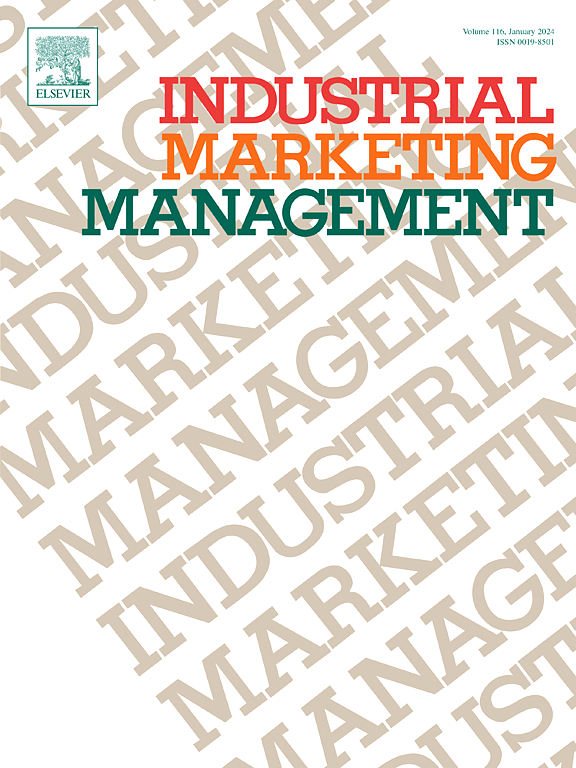Sales managers' perceptions of interpersonal communication competence in leading AI-integrated sales teams
IF 7.8
1区 管理学
Q1 BUSINESS
引用次数: 0
Abstract
Adoption of artificial intelligence (AI) is no longer the issue for most professional organizations—the question is how to integrate it into the functions and organizational processes. Considering the current integration of AI in work processes, the requirements for sales managers' interpersonal communication competence (ICC) are likely to be modified. However, research on sales management competencies is surprisingly scarce. This longitudinal case study investigates sales managers' perceptions of their ICC needs in leading AI-integrated sales teams in the financial sector. During the years 2019–2024, 35 expert interviews with sales managers were collected from one of Scandinavia's largest financial groups. The findings indicate that AI system integration brought benefits, concerns and communication challenges to sales managers' job content. The main components related to sales managers' ICC in leading AI-integrated sales teams encompass both traditional competencies (motivation, knowledge, communication skills, and adaptability) but also include contextual AI factors and a concern for ethical reflectivity. A component model of managerial interpersonal communication competence in AI-integrated teams (MICCAIT) is produced and its implications are examined. Given the greater reliance on technology, sales managers may increasingly need to place greater emphasis on their empathy and people-oriented skills for the human employees remaining in the workplace.
销售经理对人工智能集成销售团队人际沟通能力的看法
对于大多数专业组织来说,采用人工智能(AI)不再是问题,问题是如何将其集成到功能和组织流程中。考虑到目前人工智能在工作流程中的整合,对销售经理人际沟通能力(ICC)的要求可能会被修改。然而,对销售管理能力的研究却出奇的少。这个纵向案例研究调查了销售经理对金融部门领先的人工智能集成销售团队的ICC需求的看法。在2019-2024年期间,我们从斯堪的纳维亚最大的金融集团之一收集了35位销售经理的专家访谈。研究结果表明,人工智能系统集成给销售经理的工作内容带来了好处、担忧和沟通挑战。在领先的人工智能集成销售团队中,与销售经理ICC相关的主要组成部分既包括传统能力(动机、知识、沟通技巧和适应性),也包括情境人工智能因素和对道德反射率的关注。提出了人工智能集成团队(MICCAIT)管理人际沟通能力的组成模型,并对其影响进行了研究。鉴于对技术的依赖越来越大,销售经理可能越来越需要更加强调他们的同理心和以人为本的技能,以留在工作场所的人类员工。
本文章由计算机程序翻译,如有差异,请以英文原文为准。
求助全文
约1分钟内获得全文
求助全文
来源期刊

Industrial Marketing Management
Multiple-
CiteScore
17.30
自引率
20.40%
发文量
255
期刊介绍:
Industrial Marketing Management delivers theoretical, empirical, and case-based research tailored to the requirements of marketing scholars and practitioners engaged in industrial and business-to-business markets. With an editorial review board comprising prominent international scholars and practitioners, the journal ensures a harmonious blend of theory and practical applications in all articles. Scholars from North America, Europe, Australia/New Zealand, Asia, and various global regions contribute the latest findings to enhance the effectiveness and efficiency of industrial markets. This holistic approach keeps readers informed with the most timely data and contemporary insights essential for informed marketing decisions and strategies in global industrial and business-to-business markets.
 求助内容:
求助内容: 应助结果提醒方式:
应助结果提醒方式:


